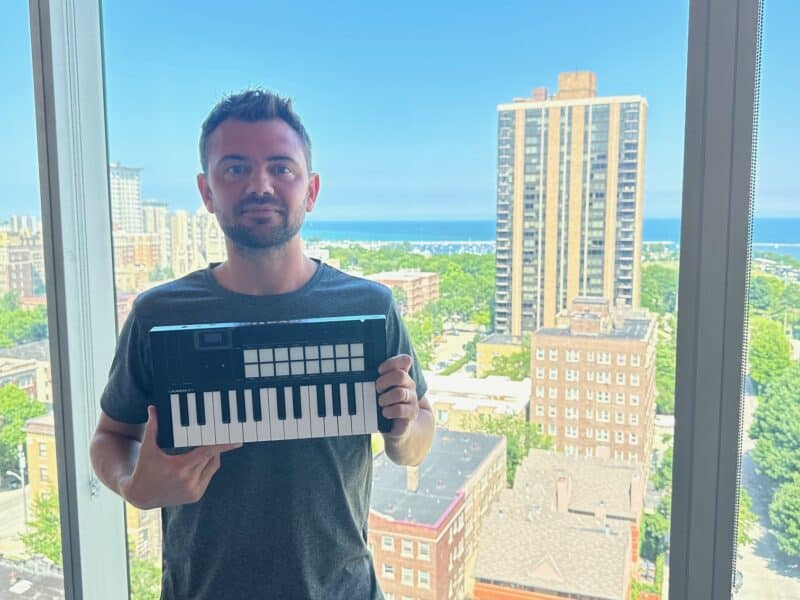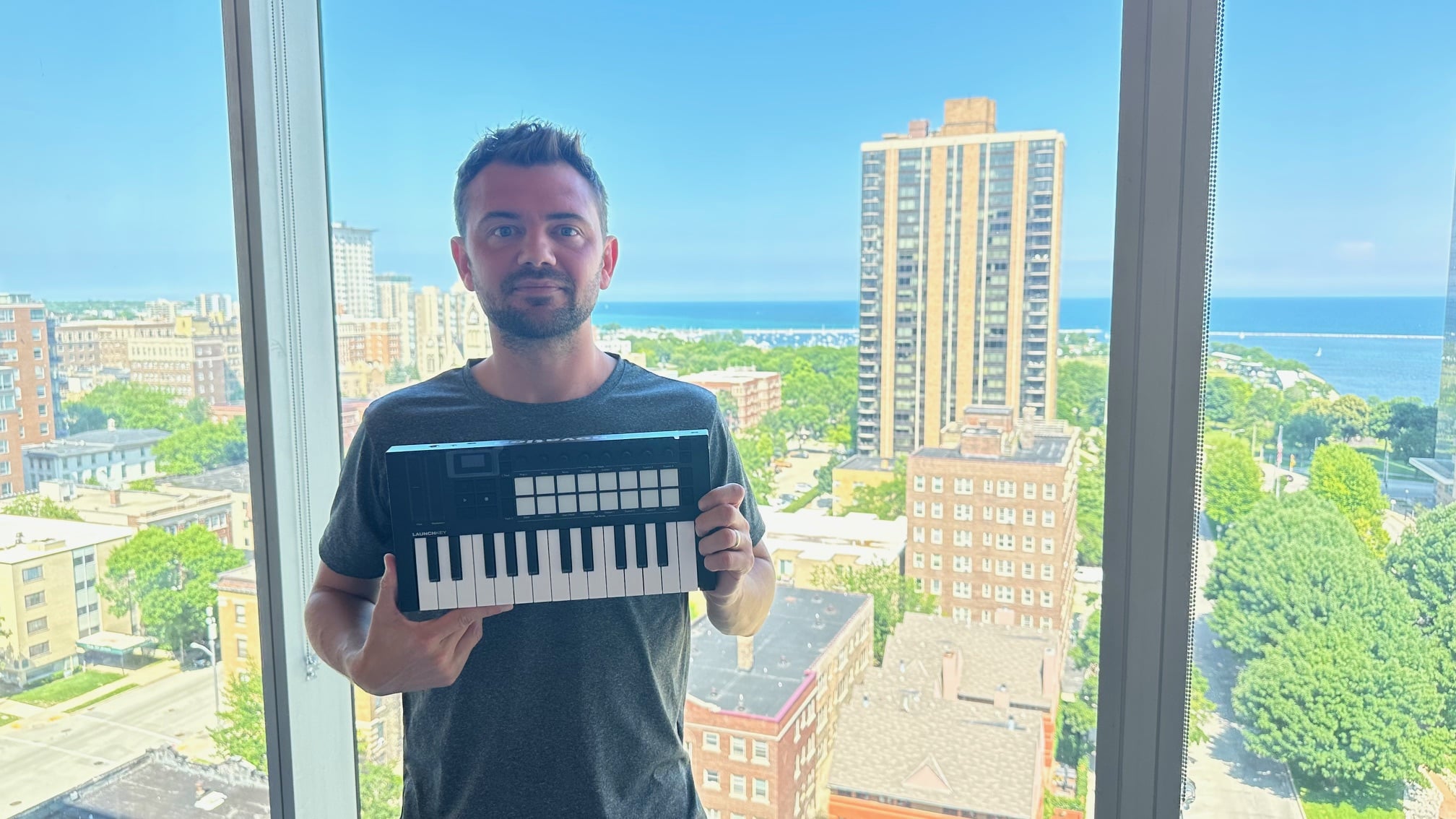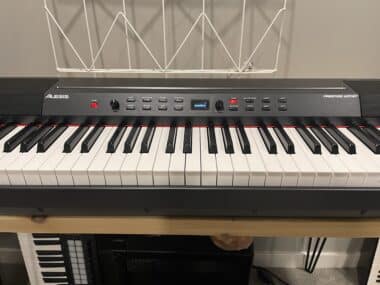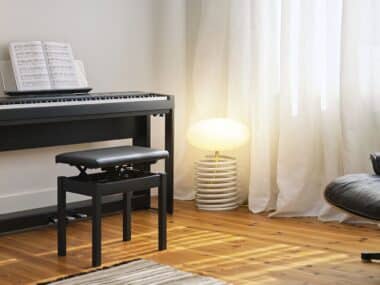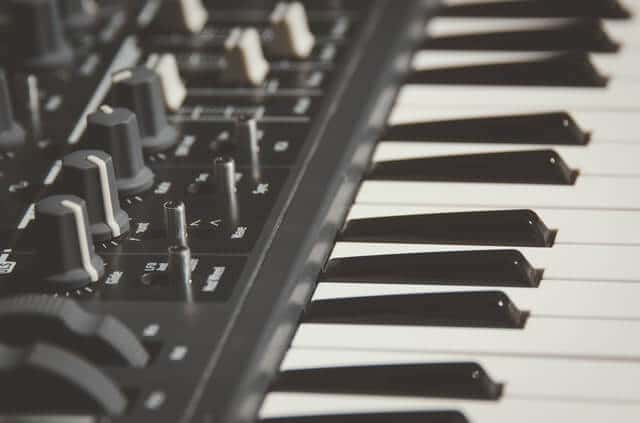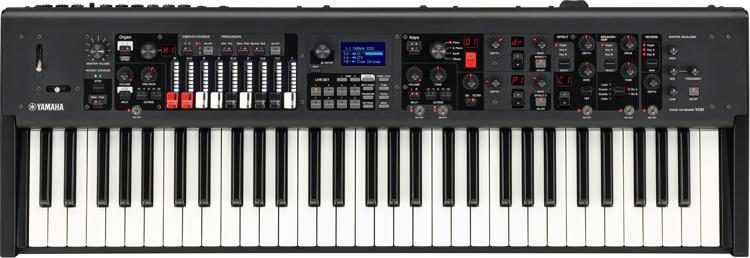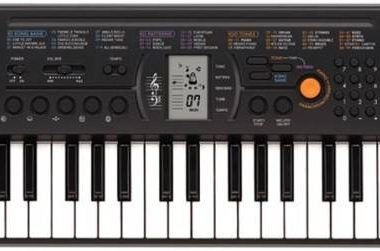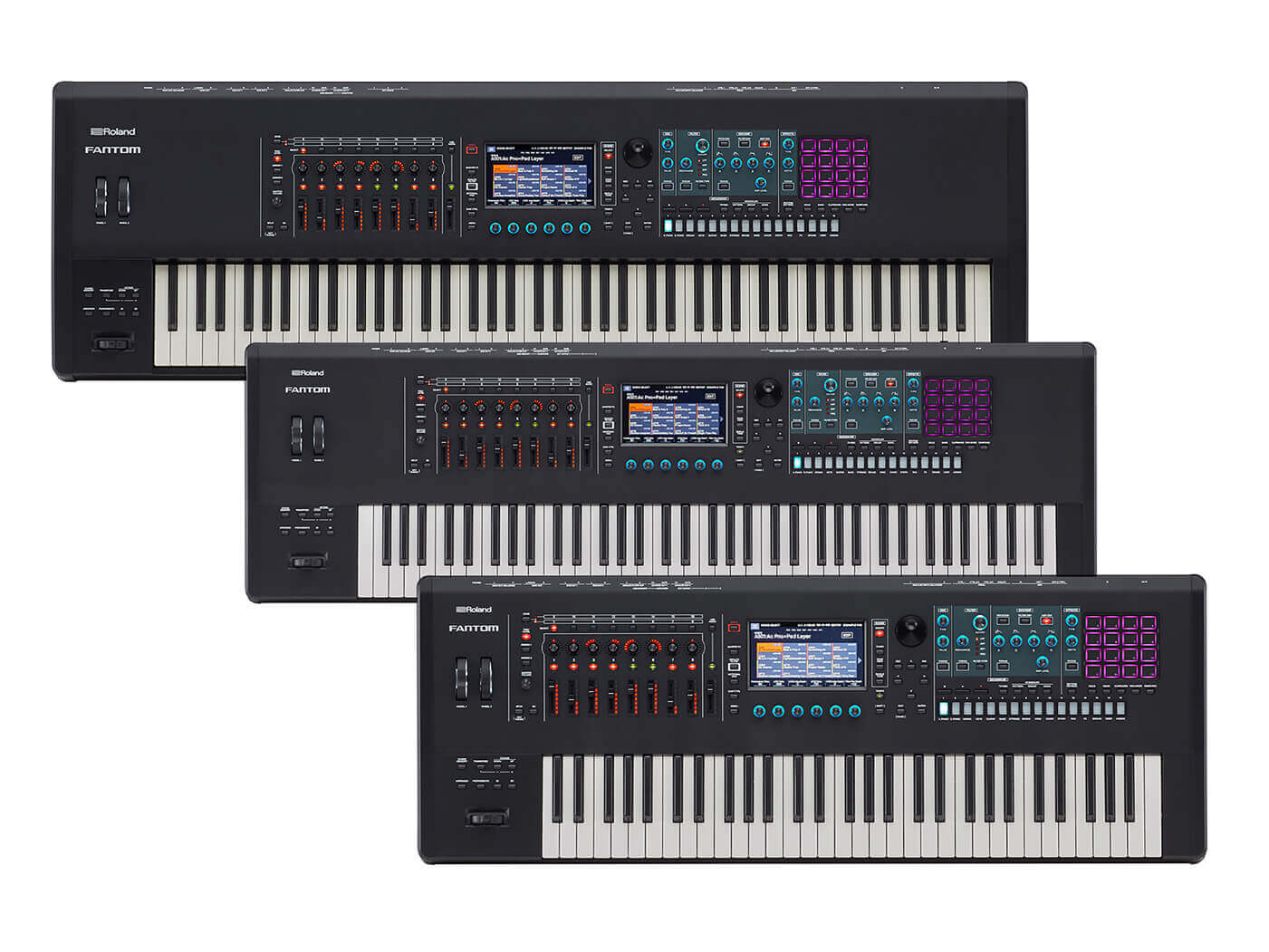Table of Contents
If you’re hunting for a compact MIDI controller that still feels professional, the Novation Launchkey Mini MK4 should be on your shortlist. As the smallest controller in the Launchkey MK4 lineup, it’s built for portability while offering enough features to handle serious production.
I’ve been testing it side by side with the MK3, and the first thing I noticed is how much more solid the MK4 feels. The keybed feels tighter, the pads are more responsive, and the overall build quality is a step up. For producers on the go, this is easily one of the best mini controllers on the market right now.
Key Features and First Impressions
The Novation Launchkey MK4 improves from the legendary Launchkey series and has given us what I think is the best mini option on the market today.
The Launchkey Mini MK4 is built around 25 mini keys, 16 velocity-sensitive RGB pads, and 8 rotary knobs. It connects via USB-C and stays bus-powered, so you don’t need to carry an extra power supply. There are also transport controls, pitch and modulation touch strips, and dedicated buttons for octave shifting.
When I first unboxed the MK4, the thing that stood out most was how much more portable it feels compared to the MK3. It’s slim, lightweight, and feels easier to throw in a backpack. The keybed feels a little more solid too. That might be a combination of improved materials and overall build quality rather than a total key redesign, but either way, it gives me more confidence when playing.
Build Quality and Design
One of the first things I noticed when switching from the MK3 to the MK4 is the overall build quality. The MK4 feels sturdier in the hands, even though it’s still made of lightweight plastic. The corners are a little more refined, and the layout of the pads and knobs feels tighter and cleaner.
The transport buttons are laid out in a way that makes sense when you’re recording, and the new USB-C connection is a small but welcome update. It feels more modern and reliable than the old micro-USB on the MK3.
While it’s not a controller you’d want to throw around carelessly, the MK4 does feel a bit more solid than the MK3. That added confidence matters when you’re tossing it in a backpack or using it for live performance setups.
Keybed and Playability
Mini controllers are always a compromise when it comes to key feel, and the Launchkey Mini MK4 is no exception. You’re working with 25 mini keys, so you don’t get the full range or the weight of a larger controller. Still, Novation has made some small but noticeable improvements here.
The keys feel a little more solid than the MK3. I can’t say for sure if Novation changed the actual mechanics of the keybed, but the overall build quality seems tighter, and that translates to a more reliable playing experience. I don’t feel as much wobble when I’m playing fast passages, which is a nice step forward.
That said, these are still mini keys, and they take some adjustment if you’re used to full-sized controllers or digital pianos. For me, they’re fine for sketching ideas, triggering samples, and even playing in short melodies or bass lines. If I want to play with more expression, I usually reach for a larger controller – but for portability, the MK4 holds its own.
Pads, Knobs, and Controls
The Launchkey Mini MK4 gives you 16 RGB velocity-sensitive pads, which I found to be noticeably more responsive than the MK3. They’re not MPC-quality, but for finger drumming, launching clips, or programming beats, they get the job done well. The full RGB backlighting also makes it easier to see what’s going on in a dim studio or stage setup.
The 8 rotary knobs are one of my favorite parts of this controller. They’re smooth to turn and map easily to parameters in Ableton Live, Logic, or FL Studio. I often use them for filter sweeps or adjusting effects, and they respond quickly without any lag. For a controller this small, having eight usable knobs is a huge plus.
Transport controls are tucked along the top row, and they make recording feel much smoother. Being able to play, stop, and record directly from the controller without reaching for the keyboard or mouse helps keep me in the creative flow. The pitch and modulation touch strips are functional, though I still prefer wheels when I have the option. On a controller this size, the strips make sense, but they don’t offer the same level of control.
DAW Integration
One of the biggest strengths of the Launchkey Mini MK4 is how well it integrates with major DAWs right out of the box. Novation has really leaned into this, and it shows when you start working with it.
With Ableton Live, the controller feels like a natural extension of the software. The pads map directly to clip launching, the knobs adjust macros, and the transport controls handle the basics without extra setup. I was able to start building ideas within minutes of plugging it in. If you’re an Ableton user, this controller feels tailor-made for you.
In Logic and FL Studio, the integration isn’t quite as deep, but it’s still impressive for a controller at this price point. I had no trouble mapping the knobs and pads to custom parameters, and the transport buttons worked without much tweaking. For Cubase and Reason, it takes a little more manual setup, but once mapped, the workflow is just as smooth.
What stands out to me is that the MK4 balances simplicity and flexibility. If you just want to plug it in and start recording, you can. If you like digging deeper and customizing every pad and knob, that’s an option too. This makes it work well for both beginners and more advanced producers.
Portability and Workflow
The Launchkey Mini MK4 is one of the most portable controllers I’ve used, and it feels even more travel-friendly than the MK3. It’s slim, lightweight, and fits easily into a backpack without taking up much space. For me, that’s one of the biggest selling points – it’s the kind of controller I can throw in my bag without worrying about weight or bulk.
The workflow improvements are subtle but noticeable. Having transport controls, octave shift, and DAW mapping all in one small package makes it easy to stay focused on creating. I don’t find myself constantly reaching for my laptop’s keyboard, which keeps me in the flow.
For producers who work on the go – whether that’s in coffee shops, hotels, or live setups – the MK4 strikes the right balance between portability and usability. It’s not a full replacement for a bigger controller, but it’s reliable enough to handle most production tasks when I’m away from the studio.
What I Like
What I enjoy most about the Launchkey Mini MK4 is how well it balances portability with functionality. I’ve used plenty of compact controllers that feel like toys, but this one feels like a real instrument. The pads are responsive, the knobs are smooth, and the transport controls actually make a difference in workflow.
I also appreciate the slight improvement in the keybed compared to the MK3. The keys feel sturdier and more reliable, even if they’re still mini-sized. That extra bit of build quality makes me more confident when I’m playing.
The portability is another huge plus. I can toss it in a backpack, plug it in with a single USB-C cable, and be up and running in seconds. For sketching out ideas quickly or traveling with minimal gear, it’s tough to beat.
What I Don’t Like
As much as I like the MK4, it’s not perfect. The lack of a sustain pedal input is probably my biggest complaint. For anyone coming from a piano background, not having that option can feel limiting.
The mini keys also won’t work for everyone. They’re fine for me when I’m writing melodies or programming chords, but if I want to play something more expressive, I always end up switching to a larger controller.
Lastly, while the pitch and mod strips are functional, they just don’t feel as expressive as wheels. I get why Novation included them – they save space – but I’d still take wheels any day if given the option.
Novation Launchkey Mini MK4 vs Arturia Minilab 3
Both the Launchkey Mini MK4 and the Arturia Minilab 3 are among the most popular mini MIDI controllers on the market. I’ve used both, and while they share similarities, they appeal to slightly different types of producers. The table below breaks down the key differences.
| Keys | 25 mini keys, improved feel vs MK3 | 25 slim keys, solid and slightly larger feel |
| Pads | 16 RGB velocity-sensitive pads | 8 RGB velocity-sensitive pads |
| Knobs | 8 rotary knobs | 8 rotary encoders (endless) |
| Controls | Transport, octave, pitch/mod strips | Transport, chord mode, pitch/mod strips |
| DAW Integration | Deep integration with Ableton Live, good with Logic, FL Studio | Excellent with Analog Lab & Arturia software, decent DAW mapping |
| Build Quality | Feels more solid than MK3, lightweight | Heavier build, sturdier feel |
| Software Included | Ableton Live Lite, Novation plug-ins | Analog Lab Intro, Ableton Live Lite, Arturia software |
| Portability | Ultra lightweight, slim, easy to pack | Slightly bulkier but still portable |
| Price | Generally a bit more affordable | Slightly higher |
My Take
If you’re an Ableton user, the Launchkey Mini MK4 integrates more naturally and feels like the better choice. It’s also the more portable of the two. The Minilab 3, on the other hand, shines for producers who want slightly larger-feeling keys and access to Arturia’s excellent Analog Lab sounds right out of the box.
Pros and Cons
Pros
- Portability makes it perfect for travel
- Improved feel over the MK3 in both keys and pads
- Excellent DAW integration, especially with Ableton Live
- Responsive pads and smooth rotary knobs
- Workflow features that reduce laptop dependence
- Affordable price for what it offers
Cons
- No sustain pedal input
- Mini keys limit expressive playing
- Pitch and mod strips less satisfying than wheels
- Plastic build, though sturdier than MK3
Who the Launchkey Mini MK4 Is Best For
I think the Launchkey Mini MK4 is best suited for producers who want a balance of portability and real functionality. If you’re an Ableton user, this is a no-brainer since the integration is as seamless as it gets at this price point. It’s also a strong pick for beginners who don’t want to spend a lot but still want a controller that feels like it can grow with them.
If you’re often producing on the go – whether that’s in hotels, coffee shops, or while traveling – the MK4 shines. I’ve carried it in my backpack and used it with just my laptop, and the workflow feels natural. It’s not a controller I’d rely on for expressive piano playing, but that’s not the point of a 25-key mini controller.
Where it might fall short is for players who want larger keys, a sustain pedal input, or deeper control for live performances. In that case, something like the larger Launchkey MK4 models or the Arturia Minilab 3 might make more sense.
Verdict
The Novation Launchkey Mini MK4 is one of the best mini MIDI controllers I’ve played to date. Novation managed to improve on the MK3 in small but meaningful ways – the keybed feels sturdier, the pads are more responsive, and the overall design is more polished. For something this portable, it doesn’t feel like a toy, and that’s what sets it apart.
It isn’t perfect. The lack of a sustain pedal input limits it for pianists, and the mini keys will never feel as natural as full-sized ones. But if you’re looking for a compact controller that integrates seamlessly with Ableton, travels well, and actually feels reliable, the Launchkey Mini MK4 is hard to beat.
For me, it’s the controller I reach for when I want to sketch ideas quickly or produce on the go. If you’re a producer looking for a balance of portability, workflow, and DAW integration, this is one of the strongest options available right now.
